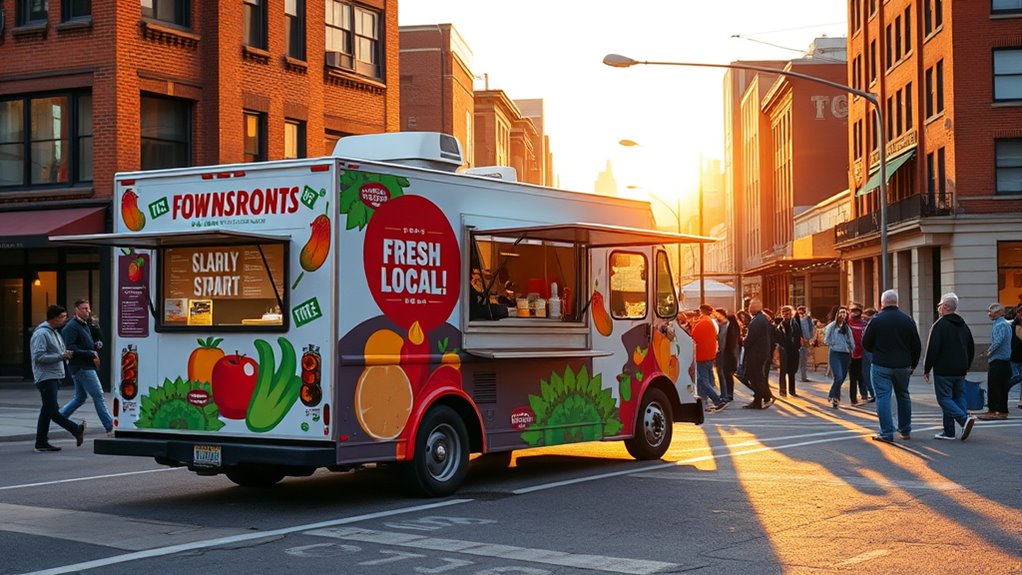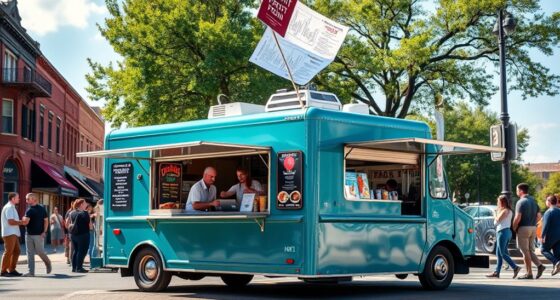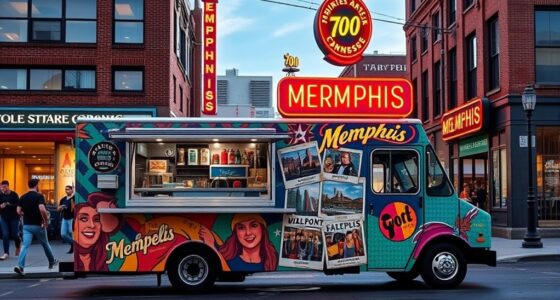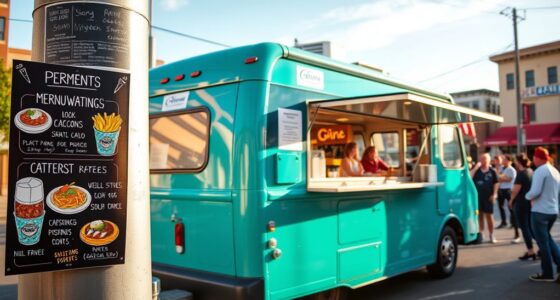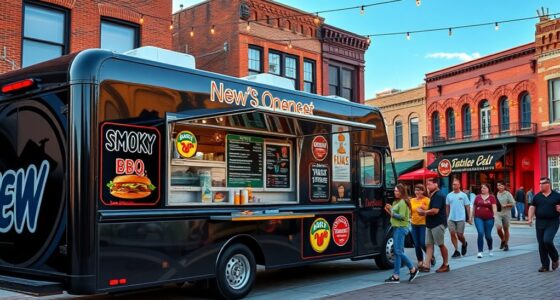Starting your food truck in Bridgeport requires obtaining multiple permits, including health, zoning, and business licenses, which typically cost between $100 and $400. You’ll need approval for specific locations, ensuring compliance with local zoning laws, and develop a menu that meets health standards. Budget for costs related to permits, equipment, and insurance. Follow safety standards and apply for marketing permits if you plan to participate in events. Keep learning to master all steps for a successful launch.
Key Takeaways
- Obtain necessary permits including health, fire safety, zoning, and business licenses, ensuring compliance with Bridgeport’s regulations.
- Budget for initial costs such as permits, vehicle registration, insurance, equipment, and ongoing renewal fees.
- Secure approved vending locations by obtaining zoning compliance, maintaining distance from parks, and adhering to setback rules.
- Develop a menu aligned with health standards, obtain approval, and ensure staff are trained in food safety and sanitation protocols.
- Promote your food truck through strategic location selection, participation in community events, and effective marketing to attract customers.
Navigating Permit Requirements and Application Procedures

Navigating permit requirements and application procedures in Bridgeport can seem complex, but understanding the key steps makes the process manageable. First, you’ll need to gather essential documents, including proof of business registration, a sales tax permit, and liability insurance that meets city standards. If you plan to operate a food truck, you must also provide health department certifications, food safety training, and commissary agreements. For mobile vendors, vehicle registration and insurance are necessary. When submitting your application, ensure it’s complete and accurate, including detailed plans of your food truck and menu. You’ll need to obtain signatures based on your business structure. City officials will verify your documents and may conduct inspections before issuing approval. Staying organized and submitting early helps streamline the process. Understanding local zoning and health regulations is also crucial to ensure your food truck complies with all operational standards. Additionally, reviewing compliance with health standards can help prevent delays during the approval process.
Understanding the Costs Involved in Licensing and Permits
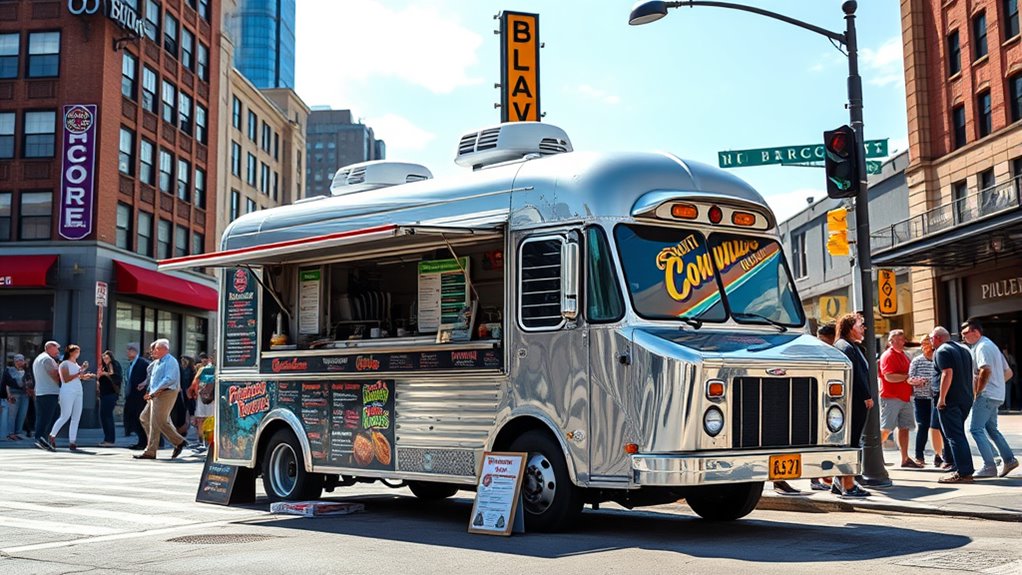
Understanding the costs involved in licensing and permits helps you budget effectively for your food truck. You’ll need to take into account various fees, from application expenses to ongoing renewal costs, which can add up quickly. Knowing these details guarantees you’re prepared for all financial requirements before hitting the streets. Additionally, implementing fraud prevention tools like transaction monitoring can help protect your business from fraudulent activities and chargebacks, ensuring smoother operations.
Licensing Fee Breakdown
When opening a food truck in Bridgeport, Connecticut, you’ll encounter a variety of licensing and permit fees that contribute to your startup costs. State registration for an LLC costs around $120, while an annual food service license is just $20. You’ll need a $100 sales tax permit to collect and remit taxes. If you plan to sell alcohol, expect application fees of $100, plus a $440 initial permit and a $500 vending fee. Local fees vary; a mobile vending license ranges from $100 to $400, with an inspection fee between $150 and $250. Additionally, you’ll need a Fire Marshal Safety Inspection and police permit—fees vary or are unspecified. Don’t forget costs for certifications, special event licenses ($100 each), and other documentation to stay compliant. Electric power generation options like bike generators can help reduce energy costs for your food truck operations.
Permit Application Expenses
Securing permits for your food truck involves several application expenses that you need to budget for upfront. You’ll pay application fees for your initial food truck license, typically between $75 and $300, with higher costs for vendor permits due to stricter regulations. Local health department permits may cost from $100 to $400, depending on your city and risk level. You’ll also need to budget for state-level permits, like the $20 annual Department of Consumer Protection license and approximately $100 for sales tax registration. If you plan to sell alcohol, permit fees hover around $100, plus initial vending costs. Additional expenses include document preparation, notarization, and fees for police permits or special event licenses. These costs ensure your application is complete and compliant with local and state regulations. Incorporating color preservation techniques can help maintain the visual appeal of your food truck’s branding and signage.
Ongoing Maintenance Costs
Managing the ongoing costs of your food truck permits and licenses is an important part of keeping your business compliant and operational. These costs include annual renewal fees for licenses, health certifications, and permits, which generally range from $100 to $400 for health and safety. You’ll also face inspection and compliance fees for fire safety and health department checks, with costs varying per inspection cycle. Food safety certifications, like manager and employee training, require renewal and can add up annually. Additionally, state and local fees—such as a $20 annual food preparation license and a $100 sales tax permit—must be budgeted for. Insurance premiums and possible promotional permit renewals also contribute to your ongoing expenses. Regularly reviewing your textile line options can help ensure you select the most cost-effective and compliant solutions for your business needs.
| Fee Type | Typical Cost Range | Renewal Frequency |
|---|---|---|
| Health & Safety Permits | $100 – $400 | Annually |
| Food Safety Certification | Up to $10 per employee | Annually |
| State & Local Fees | $20 – $100 | Annually |
Choosing Approved Locations and Complying With Zoning Laws
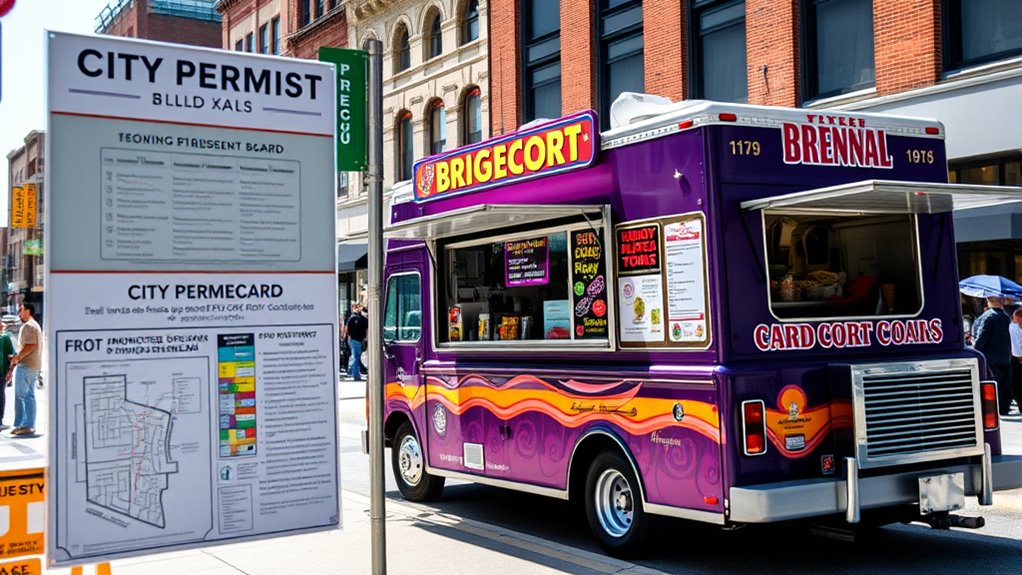
Choosing approved locations for your food truck in Bridgeport requires understanding and adhering to the city’s zoning laws and regulations. You need to obtain a Certificate of Zoning Compliance from the Zoning Department, confirming the site’s suitability for vending. Food trucks aren’t allowed within 300 feet of parks like Seaside Park, Beardsley Park, and Pleasure Beach to protect recreational areas. You’ll also need a Police Permit and must comply with specific zoning districts, which restrict vending to certain commercial, industrial, or mixed-use zones. Be mindful of setback, height, and lot coverage rules, and submit detailed floor plans if needed. Vending on private property or sidewalks requires explicit permission. The zoning map and boundary interpretations outlined in Article 3 help identify eligible zones for vending. It’s essential to stay updated on any zoning law changes that could affect your vending location. Noncompliance can lead to fines or permit revocation, so ensure all documentation and inspections are completed before operation.
Developing a Compliant Menu and Ensuring Food Safety Standards
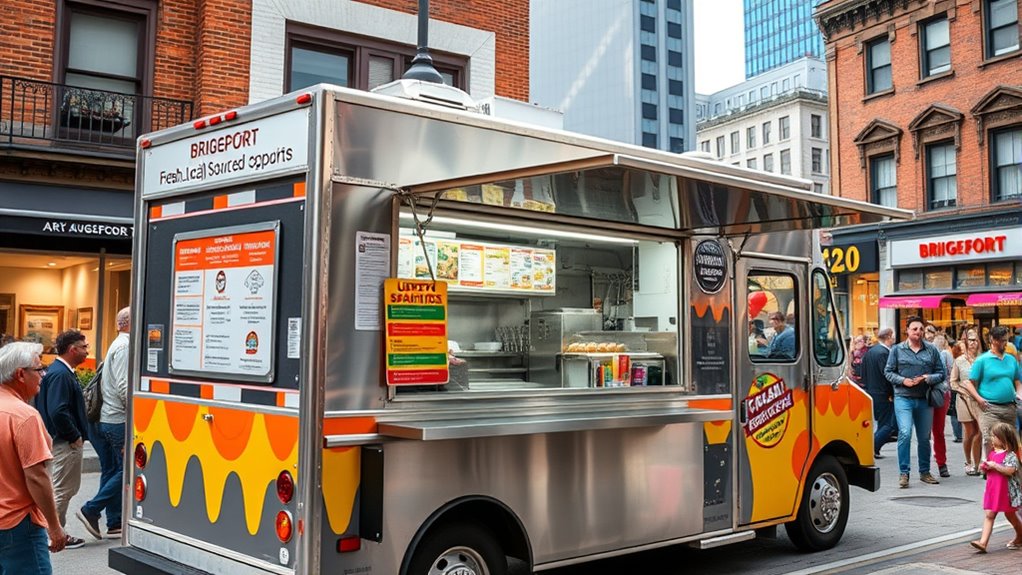
To develop a compliant menu, you need to consider food safety risks associated with each item and ensure proper handling instructions are clear. Staff training on sanitation and safe food practices is essential to meet health standards, while equipment must be maintained to prevent contamination. Additionally, staying informed about browser compatibility ensures that your digital resources and online menu displays function correctly and securely. Incorporating food safety protocols into your operations is crucial for maintaining compliance and protecting customers. By focusing on these areas, you’ll create a menu that’s both appealing and in line with Bridgeport’s food safety regulations.
Menu Item Compliance
Developing a compliant menu for your food truck requires careful attention to both regulations and food safety standards. You must list only foods that meet Bridgeport’s health and safety rules and FDA Food Code standards. Clearly disclose allergens and avoid menu items that pose high contamination risks unless prepared under strict permits. Guarantee complex dishes can be safely cooked and stored with appropriate equipment and temperature controls. Menus should reflect items that can be prepared hygienically within your limited space, avoiding raw or partially cooked foods needing special certifications. Accurate descriptions, consistent pricing, and portion sizes are essential. Allergen warnings and ingredient notices are recommended to protect customers. Remember, your menu needs approval from Bridgeport health authorities before operation, and any changes require re-approval. Understanding local regulations is crucial to ensure your menu remains compliant and safe for customers. Additionally, being aware of food safety standards can help you implement best practices in food handling and preparation.
Food Safety Training Requirements
Ensuring your food truck menu complies with health and safety standards starts with proper food safety training for all staff. In Connecticut, you’ll need to complete an approved food handler course, like ServSafe Food Handler, to obtain a Food Handler’s Permit. This training covers essential topics such as personal hygiene, cross-contamination, allergens, and temperature control. Passing the assessment with at least 75% is required. Additionally, at least one Certified Food Protection Manager (CFPM) must be on-site to oversee operations, requiring passing an accredited exam. HACCP training is also beneficial for higher-risk processes, teaching hazard identification and control to prevent foodborne illnesses. Keep certifications current through ongoing training and renewals, ensuring your team stays compliant with state health regulations and maintains food safety standards. Verify local requirements with your health department to ensure all specific licensing and documentation are properly completed.
Sanitary Equipment Standards
Maintaining sanitary equipment standards is vital for your food truck’s compliance and food safety. All equipment must meet NSF International standards for safety and sanitation, and it should be properly installed to guarantee effective temperature control for hot and cold foods. Regular cleaning and maintenance are critical to prevent contamination. Metal-stemmed probe thermometers are mandatory for continuous temperature monitoring. Your equipment must facilitate proper warming, cooling, storage, and safe serving conditions. You must also have access to a licensed commissary with a three-compartment sink for washing, rinsing, and sanitizing utensils. Hot water of at least 125°F is necessary for effective sanitation. Proper wastewater management, including protected water tanks and waste disposal, is essential. Routine inspections will verify your adherence to these standards and help maintain food safety. Additionally, understanding projector technology can enhance your presentation and display capabilities when promoting your food truck or hosting events.
Effective Marketing Strategies to Grow Your Food Truck Business

Are you leveraging the full potential of your marketing efforts to grow your food truck business? Social media is a powerful tool—68% of food truck owners use it regularly, with Facebook leading at 75%. Active social media campaigns can boost sales by 20% and encourage customers to spend about 15% more. Participating in local festivals and community events, which 80% of trucks do, increases visibility and foot traffic. Loyalty programs and email lists foster repeat business, with over half of trucks seeing a 30% increase in loyal customers. To maximize impact, focus on aligning your menu and branding with your target audience, especially Millennials and Gen Z. Use data analytics and location sharing to optimize marketing efforts and attract more customers.
| Strategy | Key Benefit | Implementation Tip |
|---|---|---|
| Social Media Campaigns | Increase sales and customer engagement | Post consistently, use targeted hashtags |
| Event Participation | Boost brand visibility | Partner with organizers for exclusive offers |
| Loyalty Programs | Encourage repeat visits | Use digital apps for easy rewards tracking |
| Data Analytics | Enhance marketing ROI | Track customer behavior for menu tweaks |
Tips for Successful Launch and Long-Term Operations
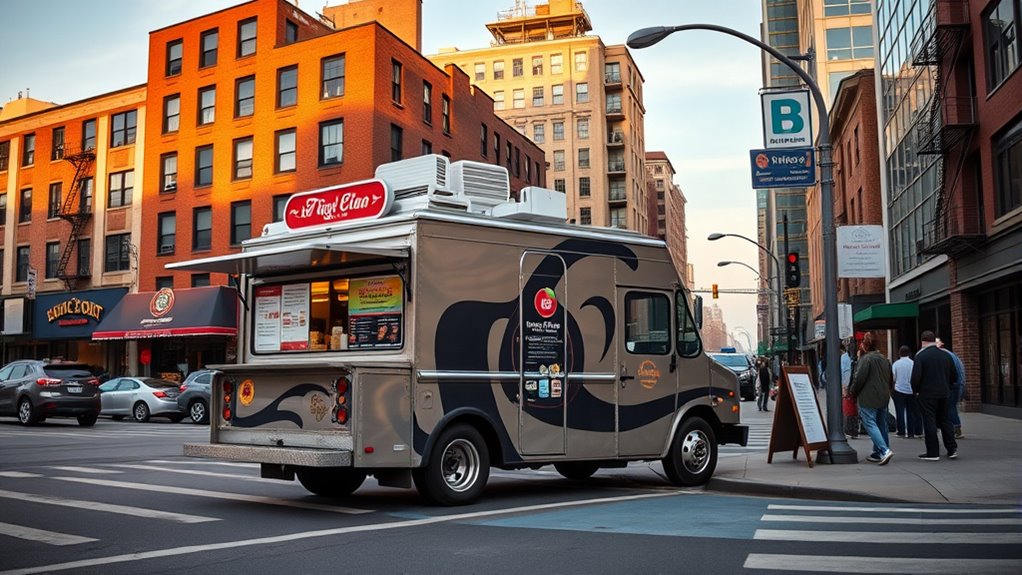
Launching your food truck successfully requires thorough planning and attention to regulations that keep your business compliant and operational. First, secure all necessary permits, including the mobile food vendor permit, Food Protection Manager Certificate, and fire safety inspection. Submit detailed floor plans for approval and ensure you have a police permit, along with any exemptions if applicable. Coordinate with local offices for zoning, building permits, and business certificates. Budget for permit fees, insurance, and potential kitchen rentals. Choose operating locations that adhere to zoning laws and maximize visibility by participating in community events or high-traffic areas. Keep detailed records of permits and inspections. Regularly review health and safety standards, train staff thoroughly, and adapt your menu and operations to evolving regulations for long-term success.
Frequently Asked Questions
How Long Does the Permit Approval Process Typically Take in Bridgeport?
You’re probably wondering how long the permit approval takes in Bridgeport. Typically, it takes 2-4 weeks for standard vendor permits, but food vendor permits with health and safety inspections can extend this to 4-6 weeks. To avoid delays, make sure your application is complete and accurate. For faster processing, you might pay extra for expedited service, which can reduce wait times to about a week.
Are There Any Restrictions on Operating Hours for Food Trucks?
Imagine you’re operating your food truck near a busy park; you need to follow specific hours. In Bridgeport, your operating times depend on your permit and location. For example, park vendors can only work from 8 AM to 8 PM from May 27 to October 15. Commercial zones may have stricter limits, and you can’t start more than an hour before or stay an hour after your permitted hours.
Can I Operate a Food Truck Without a Permanent Location?
Yes, you can operate a food truck without a permanent location in Bridgeport, but you must follow specific rules. You need a Mobile Food Vendor Permit, which involves submitting plans, passing safety inspections, and complying with zoning laws. You can’t just set up anywhere; your locations must meet city ordinances. Use social media and local events to inform customers of your current spots, ensuring you stay within regulations.
What Are the Insurance Requirements for Food Truck Operators?
You need to guarantee your food truck has the right insurance coverage. This includes general liability for accidents, commercial auto insurance for your vehicle, workers’ compensation if you have employees, property insurance for your equipment, and food spoilage coverage. These are mandatory in Connecticut. Budget around $2,000 to $4,000 annually, and compare quotes to find the best coverage. Staying compliant protects your business and meets state regulations.
How Can I Find Approved Spots That Maximize Customer Foot Traffic?
To find approved spots that maximize foot traffic, you should check the Bridgeport city government website or contact the Office of Economic and Community Development for current vending zones. Use pedestrian traffic studies, social media check-ins, and partner with local business districts to identify busy areas. Focus on high-traffic spots like downtown, waterfront parks, near major employers, and transportation hubs, especially during peak times and events.
Conclusion
Just as Odysseus navigated treacherous waters to reach his destination, your food truck journey in Bridgeport requires careful planning and perseverance. By securing permits, choosing the right locations, and crafting a standout menu, you set the course for success. Stay adaptable and committed, and you’ll find that, like a seasoned sailor, you can weather any storm. With dedication, your food truck will become a beloved staple on Bridgeport’s vibrant streets.
